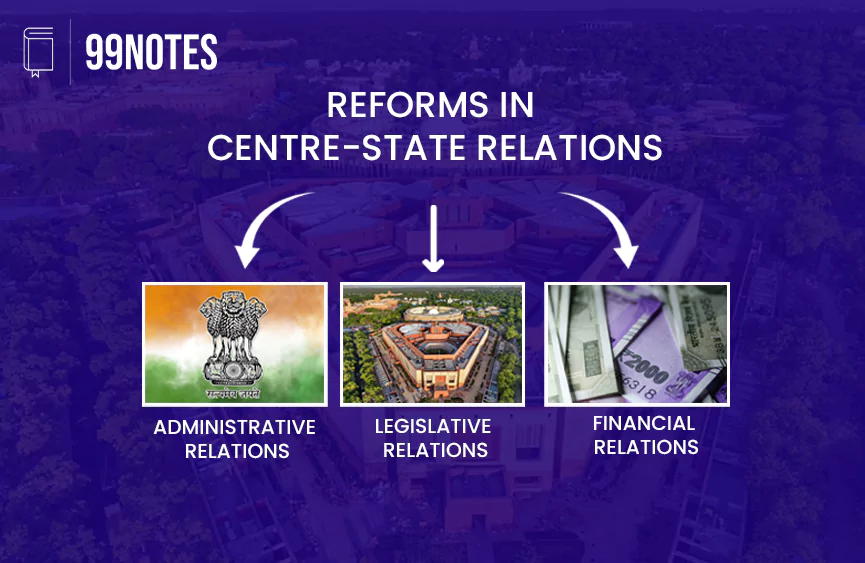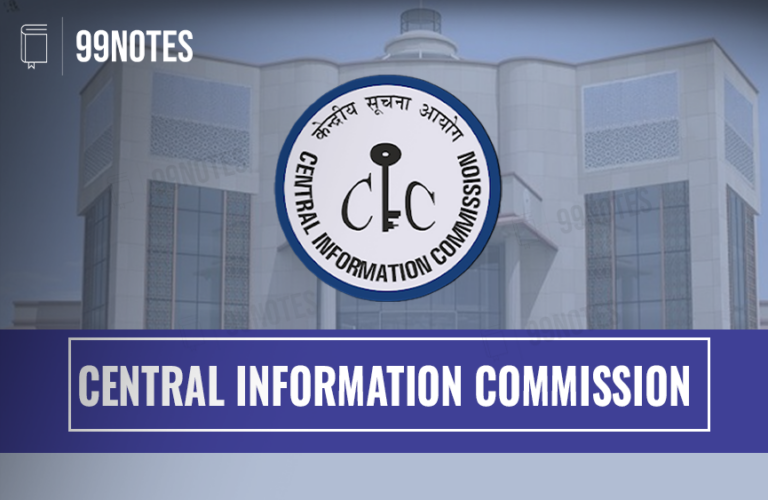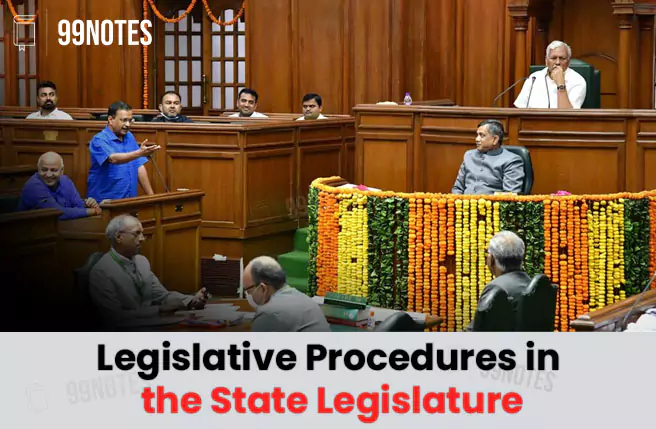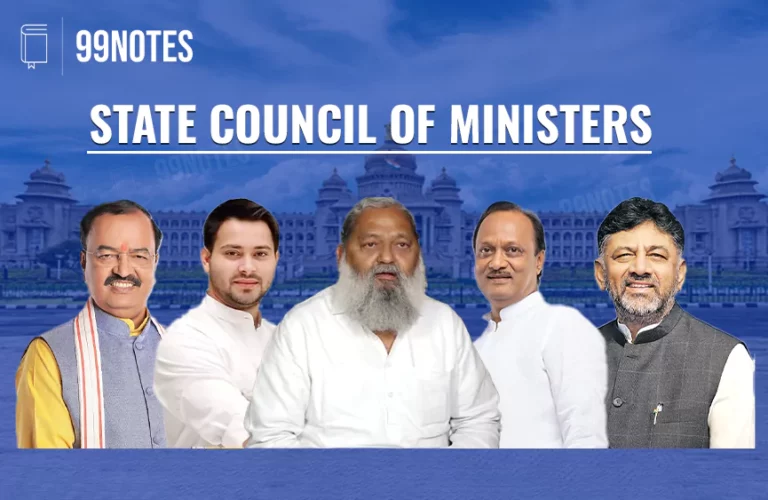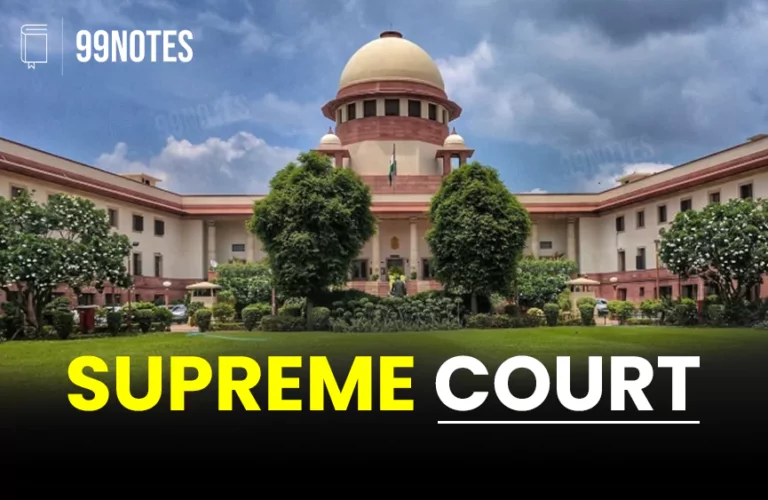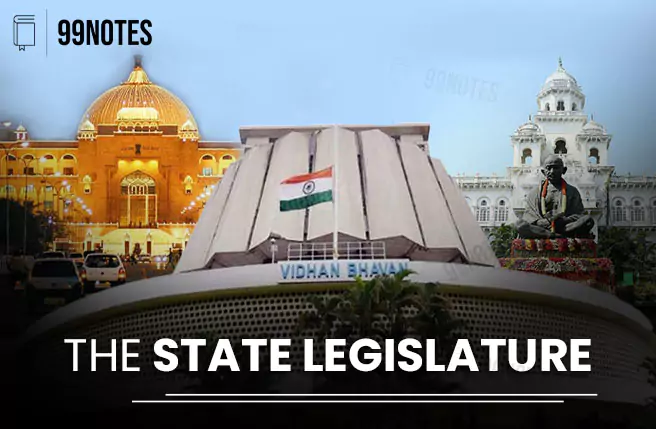Reforms in Centre-State Relations
Despite the various provisions made in the Indian Constitution for the smooth functioning of the Indian Union, it has faced many practical challenges. Most of these challenges orbit around the demand for greater autonomy.
In post-independent India, the need for planned development, national integration and maintenance of law and order led to a significant degree of centralisation of powers in the hands of the Centre. Long-term single-party government has also contributed to the Centre’s growing dominance of politics.
The working of the federal system in the last seven decades shows that centre-state relations have not always been cordial.
Till 1967, the Congress was in power both at the Centre and in most of the states; this phenomenon was described as the “Congress system” by Rajni Kothari. This level of political domination made sure of harmonious relations between states and the Centre. However, after 1967, the change in the political scenario marked a paradigm shift in centre-state relations.
Issues of Contention in Centre-state Relations
The issues that have been a bone of contention in centre-state relations are:
- Governor’s role:
- The Governor acts as the Centre’s agent and has often played a partisan role in Indian Polity.
- This is amplified by the fact that the Centre controls the appointment and removal of Governors.
- Reservation of state bills for the consideration of the President: The Governor’s right to reserve a bill for the President’s assent is another source of contention, as a governor usually reserves a bill against the advice of a state to serve the interest of the central government.
- Arbitrary imposition of President’s rule (Article 356) instead of using it as a last resort. For instance, When the Janata Government (in 1980) came into power at the Centre, it dismissed the congress government in nine states.
- Distribution of finances:
- The union government controls vast tax resources in terms of Income tax, Corporate tax, 50% of GST, Customs duties, etc. As a result, as per the 15th Finance Commission report, the Centre’s share in total tax resources in India is 62.7%.
- Only the Union government has full freedom to finance loans from the organised money market.
- The State often fails to mobilise their own resources, becoming dependent upon the Centre.
- Further, the Centre raises more than 25% of its revenue through cesses, which are not shared with states as “Net Proceeds”. Therefore, even though the 15th Finance Commission raised the State’s share to 41%, the effective allocation has stagnated between 29-32%.
- Encroachment of state list by the Centre: For example –
- 5 subjects, including Education, Forest, Administrative Justice, Weights and Measures, and Protection of Wildlife, were removed from the State list in the 42nd Constitutional Amendment
- Similarly, the Entry tax and Advertisement tax are now under the concurrent list after the introduction of GST.
- Deployment of armed forces in states for maintenance of law and order: The Union government deploys paramilitary forces without consulting the State’s government to preserve peace and order and occasionally even deploys forces against the preferences of the concerned State.
- The dominant role of non-constitutional and non-statutory bodies like the Niti Ayog in formulating schemes and approving state projects.
- Centre’s control over All India Services.
- Use of state broadcasting mediums for political purposes.
Demand for Reforms in centre-state relations
There have been various attempts in India to find a solution to the contentious issues in the Indian Federal system. The most important of these reforms are listed as follows:
Administrative Reforms Committee (1966)
To examine various issues in centre-state relations, the government appointed an administrative reforms commission under Morarji Desai. The Committee made the following recommendations:
- Establishment of Inter-state Council under Article 263 of the Constitution.
- Maximum delegation of powers to the Centre.
- During the appointment of the Governor, it should be ensured that the person should have a long experience in public life and administration and have a non-partisan attitude.
- Transfer of more resources to states in order to reduce their dependency on the Centre.
- Deployment of central armed forces in states on their request or otherwise.
No action was taken on the Committee’s recommendation.
Reform committees appointed by various states
In the following years, demands were made by various states, which appointed commissions and passed resolutions to press for reforms. A few of these demands are listed below.
I. Rajamannar Committee
In 1969, the Tamil Nadu government, under the DMK, set up a committee under the chairmanship of Dr PV Rajamannar to examine the entire gamut of centre-state relations and suggest constitutional amendments to secure greater autonomy for the states.
The Committee identified the following reasons for the centralising tendencies in the federal structure:
- Unitary provisions in the Constitution;
- The one-party rule at the Centre as well as states;
- Institution and role of planning commission;
- Tight fiscal resources of states and their dependence on the Centre;
Recommendations:
- The Finance Commission should be made a permanent body.
- An Inter-state Council should be immediately set up.
- The Planning Commission should be replaced with a statutory body.
- The All India Services should be abolished.
- Constitutional provisions dealing with the President’s rule should be completely removed.
- The provision that the state council of ministers holds office at the pleasure of the Governor should be omitted.
- Certain subjects in the Union and the concurrent list should be moved to the state list.
- The residuary powers should be transferred to the states.
The Union government did not pay attention to the recommendations of the Rajamannar committee.
II. Anandpur Sahib Resolution
The Anandpur resolution was passed by the Akali Dal in 1973. It contained political and religious demands and asked for federalism in the true sense.
The demands of the resolution were the following:
- The Centre’s jurisdiction should be limited only to defence, external affairs, communication and currency.
- The residuary powers should be transferred to states.
III. West Bengal Memorandum
In 1977, the Communist government in West Bengal published a memorandum on centre-state relations and forwarded it to the Centre.
The key suggestions of the memorandum were:
- The word ‘union’ in the Constitution should be replaced with ‘federal’.
- The Centre’s jurisdiction should be limited only to defence, external affairs, communication and currency and economic coordination.
- The residuary powers should be transferred to states.
- The provision of the President’s rule and financial emergency should be repealed.
- State’s consent should be mandatory for the formation of new states and reorganisation of existing states.
- 3/4th of the total revenue generated by the Centre should be transferred to the states.
- All India Services should be abolished.
- Powers of the Rajya Sabha should be brought at par with the Loksabha.
In the context of these demands, the government has appointed the Sarkaria Commission and Punchhi Commission to propose reforms to strengthen the Indian Federation.
Sarkaria Commission
In 1983, the Central Government set up a commission to review the Centre-state relations under the Chairmanship of Justice R.S. Sarkaria. The Committee submitted its report in 1988 and made 247 recommendations.
Some key recommendations of the commissions are:
- A permanent Inter-state Council should be set up under Article 263 (Established in 1990).
- The use of Article 356 (President’s rule) should be limited and should only be used in exceptional circumstances as a last resort.
- The residuary power of taxation should be vested in the Centre; however, in other matters, it should be transferred to the concurrent list.
- The zonal councils should be reconstituted afresh to promote the spirit of federalism.
- The net proceedings of the corporate tax should be permissibly shared with the states. (Implemented by 80th Constitutional Amendment, 1999).
- No commission of enquiry should be instituted against a state chief minister unless demanded by the Parliament.
- The Commissioner for linguistic minorities should be activated.
- Recommendations on Legislative Matters
- In the cases of state bills reserved for the President’s consideration, if the President withholds a bill, the reasons should be communicated to the states.
- The Centre should consult the states while making laws on concurrent
- Recommendations regarding the post of Governor:
- The procedure to consult the states in the appointment of Governors should be mentioned in the Constitution itself.
- The Governor cannot dismiss a council of ministers so long it enjoys a majority.
- The Governor’s term of five years should be left untouched except in compelling circumstances.
- Recommendations in favour of unitary provisions
- The institution of All India Services should be strengthened, and more services should be created.
- The Centre should have powers to deploy central armed forces in states even without the consent of states; however, consultation with states is desirable.
- The existing division of power between the Finance Commission and Planning Commission should continue.
- The three-language formula should be uniformly implemented throughout the states.
- No autonomy for Radio and Television, but their operations can be decentralised.
- No change in the role of the Rajya Sabha.
- No change in the power of the Centre to reorganise states.
The Union government has till now implemented 180 (out of 247) recommendations of the Commission. The most important of them was the establishment of the Inter-State Council in 1990.
National Commission to Review the Working of the Constitution (NCRWC)
The Commission was set up by the NDA government in 2000, under the chairmanship of Justice M.N Venkatachaliah, former chief justice of the Supreme Court, to suggest how the Constitution stay relevant in the changing times.
The key recommendations of the Commission with respect to centre-state relations are:
- The provisions of the Inter-state Council should mention the matters which should be part of the consultation.
- The subject of disaster management should be included in the concurrent
- A statutory body named the Inter-State Trade and Commerce Commission should be set up.
- Assent on State Bill: When the state bill is reserved for the President’s consideration, there should be a time limit within which the President has to act.
- Provision related to President’s Rule (Article 356)
- President’s rule in the State should be used sparingly.
- The confidence of the Council of Ministers should be tested only on the floor of the house. As long as the ministry has the confidence of the house, the Governor shouldn’t dismiss it.
- The assembly should not be dissolved before the proclamation under Article 356 has been laid before Parliament.
Punchhi Commission
In 2007, the central government constituted a Commission on Centre-State Relations under Justice Madan Mohan Punchhi, former Chief Justice of India, to examine Centre-State relations. The Commission submitted its report in 2010; the key recommendations were:
- Provisions related to the Rajya Sabha need to be changed in order to make it a representative forum of the states. There should be equality of seats in the Rajya Sabha irrespective of the population of Rajya Sabha.
- Recommendations on Institutional Cooperation
- The workings of the Inter-state Council in the management of matters of concurrent powers and overlapping jurisdiction should be continuously audited.
- An Interstate Trade and Commerce Commission should be set up under Article 307, with decision-making powers. Its recommendation and decisions should be binding on all the parties, with a right to appeal in the apex court.
- New All India Services should be created in the areas of health, education, engineering and judiciary.
- Recommendations on Distribution of Finances:
- The ceiling on professional tax should be done away with.
- The royalty rates for major minerals should be revised at least every three years. The states should be duly compensated in case of a delay in revision.
- To bring greater accountability, all fiscal legislation should be assessed by an independent body on an annual basis.
- The states should be involved in the framing of the term of reference for the Finance Commission.
- Recommendations of Legislative Matters:
- A time limit should be imposed on the President’s action in matters of state bills reserved for his consideration.
- Before introducing legislation in Parliament relating to the subjects of concurrent lists, a broad agreement should be reached between the Centre and states.
- The Centre should maintain restraint in asserting parliamentary supremacy in matters assigned to states.
- The Parliament should make a law on entry 14 of List 1 ((treaty-making and implementing it through Parliamentary legislation) to streamline the procedure. The exercise of power cannot be absolute, keeping in mind the federal scheme of the Constitution.
- It is necessary to provide constitutional frameworks to deal with situations that require the Centre’s intervention but do not warrant exceptional instruments under Articles 352 and 356. (Localised Emergency).
Recommendations related to the Governor and exercise of Article 356 (President’s Rule)
Punchhi Commission has made extensive recommendations regarding the role of the Governor in the Indian Federation.
Appointment and Removal of Governor
- During the selection of Governors, the recommendation of the Sarkaria Commission should be followed. These are:
- Person of eminence in some walk of life.
- S/he should be of outside the State.
- S/he should not be politically active in the recent past.
- He should be a detached figure and not involved with the local politics of the State.
- The Governor should have a fixed tenure of five years. His/her term should not depend on the whims of the Centre.
- The process of impeachment of the President can be replicated for the removal of the Governor.
- The Constitution does not give general discretionary power to the Governor; even in this limited choice, his/her actions should not be arbitrary.
Governor’s discretion in the appointment and Dismissal of Government
On the question of the Governor’s role in the appointment of the Chief Minister in the case of a hung assembly, the guidelines based on Constitutional conventions need to be followed. These guidelines may be as follows:
- The party or combination of parties that holds the majority in the Legislative Assembly should be invited to form the government.
- If there is a pre-poll alliance or coalition, it should be regarded as one political party, and if such coalition gets a majority, the leader of such coalition shall be invited by the Governor to form the government.
- In case no party or pre-poll coalition has been able to obtain a majority, the Governor should select the Chief Minister in the order preference indicated here:
-
- The group of parties that had pre-poll alliances held the largest number.
- The single largest party staking a claim to form the government with the backing of others.
- A post-election coalition with all partners becoming part of the government.
- A post-electoral alliance with some parties becoming part of the government and the remaining, including independents backing the government from outside.
On the question of dismissal of the chief minister, the Governor should always insist on the chief minister to prove a majority in a prescribed time.
Governor’s Role during President’s Rule:
- In case of external threat or internal disturbance paralysing the state administration, all other recourses available under Article 355 should be exercised before resorting to President Rule under Article 356.
- In cases invoking Article 356, the guidelines stated by the Supreme Court in the SR Bommai case should be followed.
Governor’s role in other Positions:
- A time limit of six months should be prescribed for the Governor to act on the bills passed by the state legislature.
- The position of the Governor as a chancellor of universities and other such positions should be eliminated. His role should be limited to the Constitutional provisions only.
Conclusion
In the past, the politics of Union-state relations centred on issues like “more powers to the states,” “more financial resources to the states,” and even calls for the Indian Constitution to be rewritten.
However, it appears that consensus rather than control will become the preeminent paradigm of centre-state relations in the years to come.
In recent years, the establishment of institutions like the GST Council and NITI Ayog, which function on consensus rather than control, has had a positive impact on centre-state relations.
Several commissions on centre-state relations, such as the Sarkaria Commission and Punchhi Commission, suggested certain constitutional changes, which, if implemented, would smoothen the relationship between the two layers of government.

